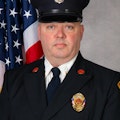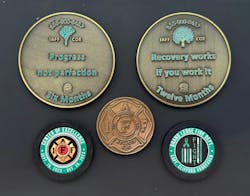I am a veteran company officer of 20-plus years. I have been in the fire service for more than 28 years. Not long ago, I read some of the multiple postings on our department board. I was drawn in by a June 2, 2024, Firehouse.com article that Chief Gary Ludwig wrote. “The Tradition of Eating Our Own” is so to the point and spot on. It made me think of another thing that’s going on in the fire service and has hit me personally: the stigma that’s attached to mental health.
In his article, Ludwig explains that “We bounce on [rookies] hard” and that he believes that “harassment, hazing and bullying” are how many veteran members determine whether rookies can handle the stress of the job. After all, the premise holds, if they can’t handle the stress of a few zingers, how will they perform when all hell is breaking loose around them and they must step up and give 100 percent perfectly?
The problem with this ill-conceived notion is that all of the stress from all of the calls, good and bad, have led to most, if not all of us, having post-traumatic stress disorder (PTSD). However, most, if not all of us, refuse to accept that we have some amount of it.
‘What’s the worst call you ever were on?’
So many seasoned firefighters and officers—the OGs of the fire service—say in regard to the stressful calls that they don’t want to talk about them, don’t want to relive them. They want to just put them in a box. “Don’t think about it. Let’s go have a drink and talk about the good times.” However, those calls are what every Tom, Dick and Harry want to know.
Furthermore, we’re told by people who really don’t quite understand the job, “Just think about all of the ones who you saved.” Well, that doesn’t work either, because those aren’t the faces that we see when we close our eyes, when we wake up from a nightmare in a cold sweat, that haunt us at different times and at different calls. It’s the ones who we couldn’t save that we see, that haunt us. We remember the day, the call, the weather, how it all went down. We just can’t get it out of our head. I know this, because, unfortunately or fortunately, I have been there, and my box was full, and it exploded open one night. I was a lucky one who somehow came out OK on the other side.
Mental health stigma
As fire/EMS people, we all have had our share of calls that involved people who were, for a lack of better way to put it—or in the spirit of fire/EMS dark humor—crazy, who were depressed, had anxiety, or, unfortunately, met their end and committed suicide. Many of us don’t really understand, don’t get why there was a problem. Just deal with it. It’s just life, and sometimes life is difficult.
It’s hard for me to admit, but that was the thought that I had toward people with mental health issues, but not anymore. My life imploded on Sept. 6, 2023, from dissociative episodes to sitting with a Glock in my mouth, before my calls for help were answered. However, I am one of the lucky ones to not end my life but, instead, to start on a path to get better, to work on myself, to get help, spending six days in a hospital adult psychiatric unit and, then, 37 days at the IAFF Center of Excellence patient facility in Maryland and continuing my aftercare through therapy twice a week to this day.
This is something that we fail to tell rookies, fail to talk about openly, how this can and will mess with our head. The mental health stigma in the first responder realm is something that’s so real. Leaders know about it, unions know about it, many members know about it, but we are failing. We say that we are there to help on the mental health side, but when it really comes down to it, do we really help each other?
When someone reaches their perceived end and their box explodes open, but, fortunately, they didn’t pull that trigger, are we there to help them? Do we really step up and do the stuff that we talk about doing for others? Or do we just let them rot?
If by God’s grace they didn’t end their life, and they got help, saw a therapist regularly, how do we treat them when they return to the job? Are we too scared to say something to them, because “What if I say the wrong thing and they regress or, even worse, end up pulling the trigger?”
If this crosses your mind—and I’m not trying to hurt any feelings here—you are way full of yourself to believe that one thing, one conversation that you have with such a person, can have that complete of an effect. It’s the very opposite. Not talking to them, not being there for them, letting them rot, has more of an effect than the one thing that you might say to them in that moment.
Remember, when we take someone who is sick or injured to the hospital, it’s just the first step of healing. It can be a long road until they actually feel better. It isn’t any different with mental health. Getting help, seeing a therapist and doing a stint at an in-patient facility are just the first steps of getting “better.” It’s all about the aftercare, therapy, medications and being right again. It’s about staying on track, belief, allowing some grace in life and trusting again.
‘It’s going to be OK’
So, let’s all talk about this more. Let’s remember why this profession chose us. We are fixers and helpers. Our families—personal and departmental—mean the world to us. When someone is suffering so much that the only way that their brain thinks of how to help or fix the problem is to end it all, let’s not let our OGs and our rookies rot. Help them the way that you would help every stranger who you run on. Have the empathy to see the hurt, the pain, and let them know that it’s going to be OK and that you are there for them.
If we start to talk about this with our rookies, if we let them know that it’s safe to discuss feelings, good and bad, then there’s help for us all.
This profession has given so much to so many, but it also has taken so much from so many. As much as this isn’t a competition, let’s not let the mental health stigma win. Stop letting them rot!
About the Author

Clifford VanDeusen
Clifford VanDeusen has served in the Grand Ledge, MI, Fire Department as both a volunteer and career firefighter. His career started in January 1996. VanDeusen moved rapidly through the volunteer ranks, and in October 2000. he accepted a full-time/career position with the department. He has been an EMT and an officer for the past 20 years, currently holding the rank of captain and public Information officer. VanDeusen served as president for the IAFF Local #2627 for nearly 16 years. He is an active member of the Capital Area Peer Support Team, which is a multijurisdictional peer support team that’s located in the Greater Lansing area that covers departments in three counties.
